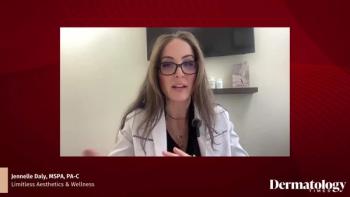
ICYMI: Atopic Dermatitis Insight at SPD
Two poster presentations at this year’s Society for Pediatric Dermatology Meeting delve into the psychological impact of the condition and a new option for management.
Atopic dermatitis (AD) was a hot topic at the 2023 Society for Pediatric Dermatology (SPD) annual meeting in Asheville, North Carolina. From sessions to posters, attendees were able to learn about emerging treatments, patient adherence, non-traditional management options, the psychological impact of AD, and more.
AD Treatment Requires Parent Involvement
In a panel discussion, leading dermatologists
Lio delved into the balancing act of treating pediatric patients appropriately and listening to and working with their parents who will be responsible for ensuring compliance, while Paller gave a detailed breakdown of topical and systemic treatment options. Feldman explained that adherence is a problem that clinicians must address with patients and parents, ensuring they understand the impact and importance of following the management plan.
Psychological Impact of AD
Patients with AD are at an increased risk of developing psychological distress and experiencing a reduced quality of life.1 In a review on the psychological effects of AD on adolescents ages 10 and older compared to peers without AD, patients with AD experienced higher levels of anxiety, depression, and social isolation. The authors of the poster, presented at the
AB-101a Hydrogel as a Treatment Option
Effective and safe options for treatment of AD in adolescents that reduce inflammation, pruritis, and colonizing bacteria that lead to AD flares and infectionare needed2 summarized the authors of another poster. AB-101a is a first in class complex drug sourced from a single plant. Its bioactive compounds offer anti-inflammatory, anti-pruritic, and antibacterial actions.
In 7 centers, the first in human phase 2 study evaluated the safety and efficacy of AB-101a hydrogel 40% compared to a vehicle in mild to moderate AD. Patients ages 2 to 66 years were treated for up to 4 weeks in a randomized, double-blind, vehicle-controlled trial. The 41 participants applied the hydrogel or vehicle twice daily and returned for evaluation on days 4, 8, 15, 22, and 29.
In the pediatric cohort (ages 2-17 years), 53.3% of patients receiving the AB-101a treatment achieved at least a 1-point decrease in Investigator Global Assessment (IGA) score at day 29 compared with 0% of the participants receiving the vehicle achieving a 1-point decrease. In the adult cohort (ages 18-66 years), 60% of patients in the AB-101a group achieved at least a 1-point decrease in IGA score compared to 37.5% of those receiving the vehicle.
The drug related adverse events included minimal transient mild stinging on application limited to 1 or 2 visits reported by 3 patients, and headache experienced by 1 patient. Study authors concluded, “AB-101a demonstrates clear and remarkable results, especially given the overwhelmingly mild AD clinical trial population. AB-101a is a promising, unique topical AD drug for children and adults with potential for long-term and continuous use.”2
The Future of AD
At the SPD 49th
References
- Swaroop S, RN, FNP Student. Psychological effects of persistent atopic dermatitis. Massachusetts College of Pharmacy and Health Sciences. Boston, Massachusetts. Poster presented at the 2023 Society for Pediatric Dermatology Meeting; July 13-16, 2023. Asheville, North Carolina.
- Koller N, Spelman L, Shumack S, et al. Phase 2 trial of 40% AB-101a Hydrogel: A novel topical drug candidate for mild to moderate atopic dermatitis in children and adults. Poster presented at the 2023 Society for Pediatric Dermatology Meeting; July 13-16, 2023. Asheville, North Carolina.
Newsletter
Like what you’re reading? Subscribe to Dermatology Times for weekly updates on therapies, innovations, and real-world practice tips.









